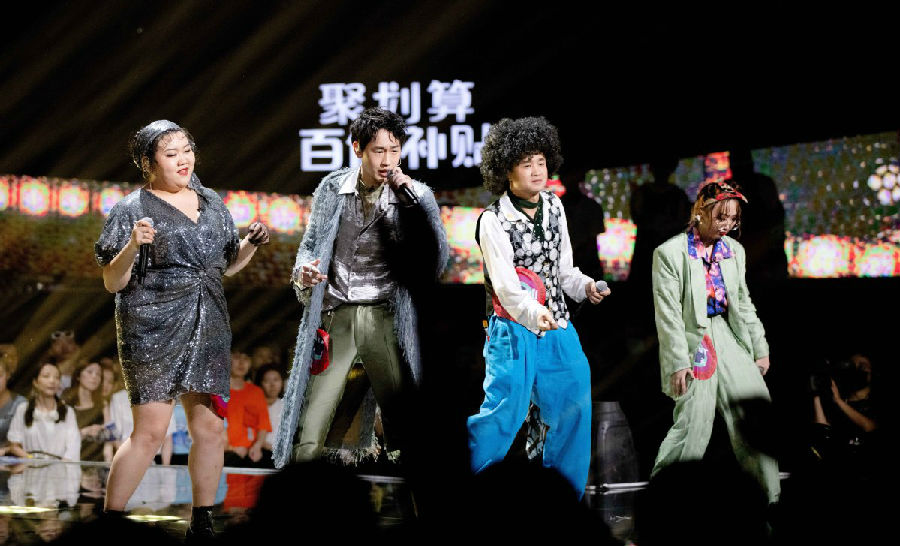Expressing through rap
Diss并非說唱的唯一表達
Rap is no stranger to negative stereotypes, but this entertainment medium, much like all artistic attempts, is at its core a means of human expression.
對于說唱的負面刻板印象并不少見,但如同所有藝術嘗試一樣,這種娛樂媒介歸根結底都是一種人類的表達形式。
Rapper Chen Jinnan is an example of one artist who exemplifies this. Chen made her stage debut on the reality show Rap for Youth on the video sharing site Bilibili and made headlines for her song Malice From the World.
說唱歌手陳近南就是這樣一個例子。陳近南在視頻分享網站嗶哩嗶哩一檔真人秀節目《說唱新世代》首次登臺,并因其歌曲《來自世界的惡意》上了頭條。
In the song, she rapped: "There are rumors about me going around the campus. They say that I am a girl with a problem, but nobody cares if I am sick ... I woke up during the middle of the night and started crying endlessly. This is not my fault, but how can I prove myself? I feel the world is full of malice."
在這首歌里,她如此說唱道:“學校里流傳著關于我的各種爭議,說我是問題少女,沒人關心我是否生病……在夜晚驚醒又開始漫長的哭泣,這不是我的問題,我要該向誰證明?我終于感到來自世界的惡意。”
Chen said that she wrote the song last year after receiving a message from a fan who was studying in Canada, was battling severe depression and had been ignored by her parents and schoolmates.
陳近南稱,收到一位粉絲來信后,她在去年寫下了這首歌。這位粉絲在加拿大留學,患有嚴重抑郁癥,但她的父母和同學都對其視而不見。
"No one understood just how severe her depression was, and she was considered a problem. I shared my own story with her in the hope of offering her encouragement," Chen told China Daily.
“沒人理解她的抑郁癥有多嚴重,別人都覺得她是個麻煩。我和她分享了自己的故事,希望能帶給她力量,”陳近南在接受《中國日報》采訪時表示。

Another rapper who appeared on the show is accomplished rapper TangoZ, who expresses his love for his hometown of Hangzhou – his "heaven on Earth" – and raps in the dialect.
節目中另一位說唱歌手是才華橫溢的鐘祺(TangoZ),他用方言說唱來表達自己對家鄉杭州——他的“人間天堂”——的熱愛。
"The rate of Wu dialect erosion is high. It's not like Sichuan, Chongqing or Guangzhou," he told independent media platform RADII China. "A lot of people would go learn certain dialects because they love Higher Brothers, so I want to make Wu dialect rap a bit better on this path as well."
“吳語流失度很高,和川渝以及廣州的情況不同,”他在接受獨立媒體平臺RADII China采訪時表示。“很多人因為喜歡說唱組合‘更高兄弟’而學某種方言,所以我也想讓吳語說唱在這條路上走得更好。”
Just as Li Yuchun, a mentor on the reality show, pointed out, rapping is not defined by anger and provocation. "A lot of people think that Diss – disrespect or disparage – is the only definition of rap. But on this show, I'm touched and proud of the fact that you can express love and kindness through music writing and rapping," she said.
就像導師李宇春在節目中所指出的那樣,說唱不是憤怒和挑釁的代名詞。“很多人以為Diss(即不尊重或貶低),是說唱的唯一定義。但在這個節目中,大家通過音樂創作和說唱傳達出了愛和善意,令我感動又驕傲。”
Actually, rapping, for most performers, is a way to express opinions and let their voices be heard. If you dive deep into it, you'll find that "it's beautiful, stemming from the soul, derived from poetry and ancient folk tunes", wrote Hannah George on the website Soundigest. "It's a diary ... someone's life on display for the world to enjoy, grieve with or be inspired by."
實際上,對于大多表演者而言,說唱是一種表達觀點、讓他們的聲音被聽到的方式。在深入了解后,你就會發現“說唱很美,它源于靈魂,源于詩歌和古老的民間小調”,漢娜·喬治在Soundigest網站上如此寫道。“它是一本日記……展現了一個人的生活,讓全世界共同欣賞、悲傷、受到鼓舞。”











